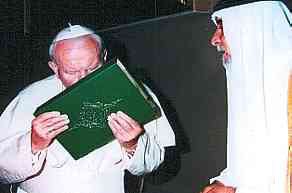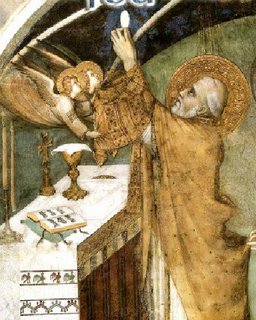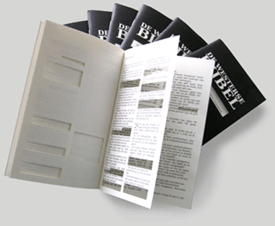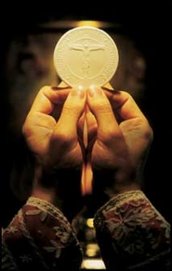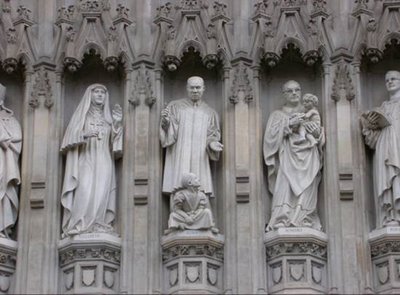
In my first week of New Testament Greek class at college, I met a nice fellow who became a close Christian brother to me. He was born prematurely and a medical mishap led to near total blindness but he never let his disability discourage him. In college, we both attended Intervarsity Christian fellowship meetings together as well as a Bible study led by a Greek professor from Lehigh University who read straight from the Greek New Testament. I found out my good friend also went to Saturday Vigil Mass and was Catholic! Later, after going to Harvard for his Master's degree, my friend became a Catholic priest.
I wanted to post his reflections on Mary since many protestants and some converts struggle with Mary's role in our life of faith. We Catholics like to call her the
Blessed Mother in order to obey Scripture when it says that "All Generations shall call me Blessed." To redundantly reiterate one more time,
we don't worship Mary.
Only God gets our worship.
My Soul Magnifies the Lord
by
Father Bernard J. Ezaki
Being a legally blind priest does indeed have its drawbacks. For one thing, I cannot read most printed material without the aid of a magnifying glass. This includes even the Liturgy of the Hours--the continual cycle of Psalms, Scripture readings, and prayers that the clergy and religious are obliged to pray at various times during each day. Often I find using a magnifier somewhat frustrating, to say the least. Why can’t I just read the Psalms like everyone else, without this stupid lens? Why can’t I get at the Scriptures and prayers directly? Why must this thing, which is nothing more than a clear piece of glass, stand in my way?
The answers, of course, are obvious even as I raise the questions. My trusty magnifying glass is only a clear bit of matter, of much less importance than the Psalms I happen to be reading. Take away the glass, however, and I am helpless in getting at the Psalms. It is my blindness, not the magnifier, that presents the real problem. I ought to be grateful for the lens, because it brings into clear focus what would otherwise be beyond me. The Psalms are ultimately more important than my magnifying glass, but in my approach to the Psalms, the glass must come first. The lens must stand immediately before my eye if I am to have access to the words. This is a fact of life brought about by my own inability to see.
It is a strange fact that we Catholics today often feel the same kind of frustration about praying to Mary as I do about using a magnifying glass. We ask: Why does Mary have to come between Jesus and me? Why can’t I go directly to Our Lord without resorting to Our Lady? Mary is, after all, only a creature, albeit a sinless one. So why must this Third Party interpose herself between Christ and me?
Yet if we regard sin as a kind of partial blindness and Mary as a kind of magnifying glass, I think the answers are pretty obvious. Yes, Mary is a created being, in no way comparable to the infinite majesty of her divine Son; but take her away, and we have no hope of seeing Jesus clearly. Just as my little lens enlarges the printed Word, allowing me to grasp the meaning of the sacred text, so Mary our Magnifier reveals Christ, the Word of God, to us who have been partially blinded by sin. It is not a matter of going to Mary versus going directly to Jesus. Going to Mary is going directly to Jesus. That’s why the saints refer to Mary as the Mediatrix of all graces. That’s why the Church constantly asks her to “show unto us the blessed fruit of thy womb.” That’s why Mary herself declares, “My soul magnifies the Lord” (Luke 1:46). Mary is not the problem. Our sinfulness is the problem, and she is the answer. She is the one who brings Our Lord into sharp clarity for us. Thanks be to God! A friend of mine who owns a transparent glass statue of Our Lady put the matter quite simply: “I like that statue,” she said, “because when I look at it, I see clear through to Jesus.”
Make no mistake. The dignity of Christ surpasses that of Mary in every way. The Word of God comes before Mary in time and eternity, in majesty and holiness. Yet as we approach the Divine, Mary the Magnifier must intervene and come before the Word. Mary’s priority is not a priority of dignity but of proximity. She must stand immediately before us if we are to focus in on her Son. This is a fact of life brought about by the presbyopia of sin.
Believe it or not, sometimes I am so caught up in reading the Psalms in my breviary that I actually forget that I am using a magnifying glass! Does this mean that the magnifier is no longer assisting me? Of course not! My lens comes to my aid even if I fail to be aware of its help. This, I believe, is like the situation of Protestant Christians who do not pay as much attention to Mary as we Catholics do. They are so caught up in Jesus, the Word of God, that they fail to realize how much Our Lady is helping them. Does this mean that the Magnifier is no longer assisting them? Of course not! Mary comes to the aid of her children even if we are unaware of her help. The bride and groom at Cana’s marriage feast obviously knew nothing of Mary’s intercession with her Son on their behalf (John 2:1-12). Who knows how much our Mother pleads for us before Christ without our ever realizing it?
A magnifying glass does more than enlarge the printed word. It can also focus a beam of sunlight in such a way as to ignite a lifeless leaf.
Come, then, O Virgin Mother, clearest of souls, and direct the light of your Son into our withered hearts. Set us ablaze with the fire of His love. Amen





